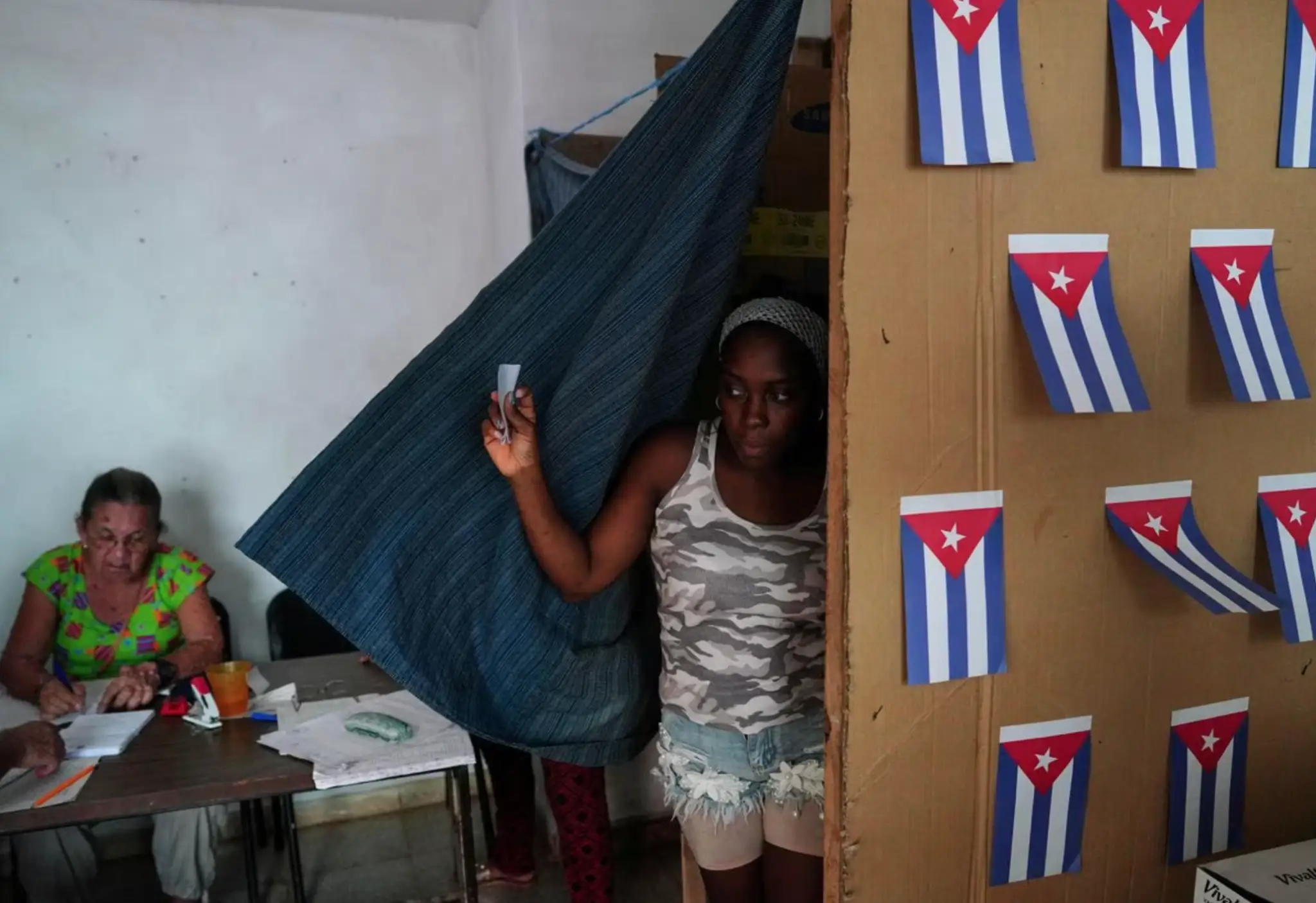Coauthor Felipe Galli
In a dictatorship, elections — let’s call them voting — are useful for some things. Although they are not, as in democracy, mechanisms to peacefully and periodically renew power, these elections serve as an ornament for formal validation of the authoritarian government, inside and outside the country. Voting also serves as a tool to co-opt and mobilize sympathizers, to besiege and demoralize opponents, and to inform the government itself of the very popular support.
Today, March 26, the general elections will take place in Cuba, whose nominal purpose is to renew the 470 seats of the National Assembly of People’s Power, the highest legislative body (again, nominal) of the Caribbean country. Eight million registered voters receive a ballot containing, already designated, congresspersons who will represent their municipality. You will be given a few options: vote for the entire list, vote for one of the list, or, in the case of municipalities with three or more representatives, vote for some and discard others. There is no possibility of rejecting the entire list. Thus, there is no competition whatsoever. You vote but do not choose.
For many, considering the political context of a Leninist regime closed to outside scrutiny, such a process would be of no interest. In fact, in the totalitarian Cuba of a decade ago, between 95 and 98% of the registered electorate would have voted, the null vote would not have exceeded 3% and more than 90% would have approved the entire list without even bothering to mark one candidate or another. A simple ritual to confirm the legitimacy of the dictatorship. Not voting would be seen as a sign of dissidence, an easy way to “mark” an opponent. Therefore, abstention would always be the minimum.
However, Andreas Schedler (La política de la incertidumbre en los regímenes electorales autoritarios, Mexico, Fondo de Cultura, 2016) explains that elections under a dictatorship can be for the citizenry arenas of questioning and mobilization against the authorities. Adam Przeworski reminds us (¿Por qué tomarse la molestia de hacer elecciones?, Pequeño manual para entender el funcionamiento de la democracia, Siglo XXI Editores, Buenos Aires, 2019) that these non-competitive elections continue to invoke as the ultimate source of power the people, whom they seek to mobilize in support of the dictators.
Once these objectives are not attainable and the numbers drop, the weakening of political control opens the doors to the opposition challenge. In the Cuban case, the gradual decrease in participation in these elections — which reached almost half of the electorate in the capital, between abstention and null vote in last November’s local elections — is a reflection of demographic trends, with its political correlate.
There are examples of increased abstention in the context of authoritarian elections. In Kazakhstan, a former Soviet Union republic whose people have not seen a free and fair electoral process in their entire history, the regime headed by Kassym-Khomart Tokayev, successor to post-Soviet dictator Nursultan Nazarbayev, has been facing increasing abstentionism in major cities. In the March 19 legislative elections, turnout fell to just under 53%. Turnout was down across the country and in the capital, Almaty, only 25% of the registered electorate voted.
Returning to Cuba, we see today a divided country. We could distinguish in today’s Cuban society, regarding its position toward the political situation and, above all, toward the electoral process, three thirds. They summarize diverse social, generational, and regional factors that cross all segments of the Cuban population. Democratically recovering an old North Korean terminology, this panorama — drawn by the sum of several surveys, interviews, and two focus groups carried out last October on the island — would be presented as follows.
The “Loyalists”: in this stratum are those who, sympathizing with the government, turn out to vote in its support. The muscle of social support for the dictatorship is made up of older or middle-aged people (who were born and grew up under better times of socialism, being influenced by years of continuous propaganda). Often, with a low level of income, information, and political culture; together with members of the bureaucracy, the military, and the business community, together with their families.
The “Hesitants”: this group oscillates between supporting the government or rejecting it and are the most politically passive and demobilized faction of the population. An electorate that, in a democratic regime, would alternate between different parties or candidates and that, ultimately, ends up defining an election. In a context such as Cuba’s, it is people who hesitate between voting and abstaining.
Many of this group vote for the sole purpose of not branding themselves as dissidents, while those who abstain do so more out of boredom than out of a conscious and energetic rejection of the dictatorship. In the event that they decide to vote, they are more likely to cast some kind of vote that breaks the uniformity of the entire list (selective voting for some candidates, voting blank, altering the ballot to nullify it, etc.). This is the most plural stratum, with an age range from young adults to middle-aged, including private sectors and with adequate levels of education.
The “Hostile”: this is the citizenry opposed to the regime, determined not to vote with the conscious objective of showing their discontent. They often try to convince others not to vote. The most vocal opposition age group is concentrated in the youth, intellectual groups, and in the big cities, although, again, here we can find people of all ages. There are localities in the country, with opposition roots, that fit into this category.
As the electoral is a system or a process and not only the day when the voting takes place, there is too much evidence ex-ante of electoral illicit acts in the country. In the last weeks, the dictatorship has used the 3 C’s: Control, cooptation, and convincing — to guarantee a favorable vote. Threats to (outlawed) observation groups and independent journalists, door-to-door mobilization of voters, support marches with officials, and sales fairs of food and deficit goods are proof of this.
The dictatorship will hardly obtain levels close to the old 90% typical of the Soviet model. There seems to be a consensus — from the crossing of previous results, and recent polls — that a 60 or 70% turnout at the national level is a plausible result, with lower levels in the capitals. Something that, under conditions of the monopoly of power and propaganda, questions the lack of pluralism and representation of the Cuban regime.
However, the shadow of fraud tout court, in the totalization of the votes, appears on the horizon. It happened in the GDR in 1989, shortly before the fall of the Wall, and also in the elections to the Constituent in Venezuela in 2017. Faced with the exposure of their discredit, dictators correct the figures to show non-existent overwhelming support. Simple logic leads to a conclusion: why would a regime like the Cuban one, which is closed to independent scrutiny and carries out a process in which observation is criminalized, publicly and unreservedly recognize the only form of an electoral setback it can suffer?
In this scenario, the denunciations of the independent observers and the citizen reports of their (non) vote, will be an approximate indicator of the kidnapped truth. In the end, despite what the regime tries to sell us, the voice and the exit (Hirschman) continue to grow in Cuba, in the face of dwindling loyalty.
*Felipe Galli is a student of Political Science at the University of Buenos Aires, co-founder of the media Carta Política, and member of the Contexto Cubano initiative.
Translated from Spanish by Janaína Ruviaro da Silva
Autor
PhD. in History and Regional Studies, Universidad Veracruzana (Mexico). Master in Political Science, University of Havana. Specialized in autocratic processes and regimes in Latin America and Russia.












